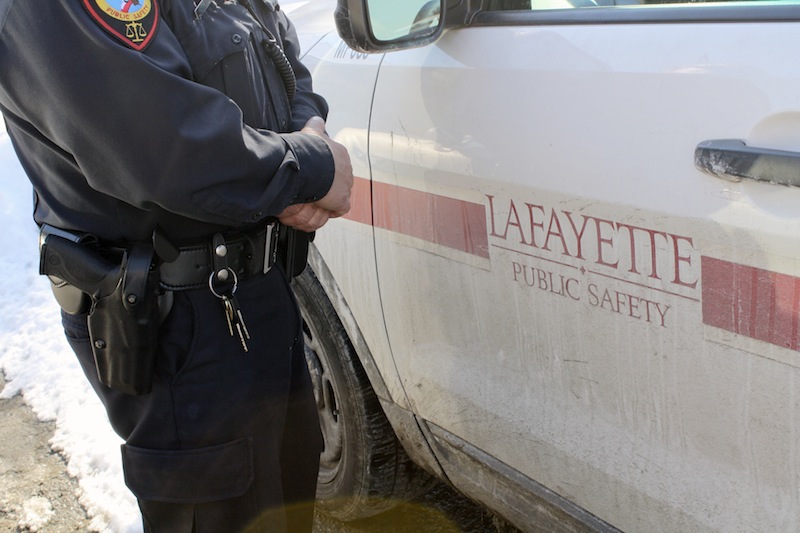As worldwide protests against racism and police brutality continue, a petition to divest resources from the Lafayette Public Safety Department and Easton Police Department accumulated over 1000 signatures as of Thursday evening. The petition, signed by Lafayette students, faculty and alumni, listed 14 demands to “abolish and address systems that disproportionately harm BIPOC [Black, Indigenous and People of Color]” and was sent to President Alison Byerly on June 6.
In addition to the demands, the petition included 37 testimonies from the Lafayette community that “demonstrate a pattern of racial profiling and harassment” by Public Safety and the Easton Police Department, according to an appendix attached to the email.
Students, faculty and alumni alike reported numerous instances of unwarranted stops and searches and poor handling of sensitive issues from suicide attempts to panic attacks in their testimonies. Many also reported general discomfort with the presence of firearms in public spaces like the Skillman library.
Byerly responded to the email with the creation of a task force to gather community input and recommendations, but did not go any further in addressing the demands. Emma Sherry ‘18 and Alex Bell ‘18, the creators of the petition, wrote in an email to signatories that Byerly’s response was “insufficient” and “insulting.”
“It was typical of the college’s response, which is [to] put together a committee and kick the can until people forget about it,” Sherry said.
In an email to The Lafayette, Byerly wrote that she received additional feedback “on the role of Public Safety” and “on larger issues of racism” during a town hall discussion on June 11.
“I believe the steps we have committed to are important, but they are just first steps in a long journey,” Byerly wrote. “I recognize that we will need to move faster than we have in the past in order to get to the more equitable and inclusive Lafayette that we all want.”
Many of the demands in the petition aligned with demands being made in cities and on campuses across the country, including reappropriating Public Safety funds to mental health professionals and unarmed urgent responders, disarming officers except in emergencies and increasing the transparency of officer conduct records. Signatories also requested additional racial bias and ethics training “focused on de-escalation and minimizing the use of force.”
“The college should prioritize a system of support for BIPOC students rather than causing them undue harm,” the petition read.
Outside of demands for reforms to Lafayette’s private police force, the petition also called for the college to suspend any collaboration with the Easton Police Department “beyond maintaining basic pathways to report criminal cases.” Issues with Public Safety and the local police often overlap, Bell said, given the “strong collaborative relationship” between the two departments.
Furthermore, there is confusion over jurisdiction, especially for senior students who live off campus and therefore interact with city and state law enforcement instead. Efforts to integrate Lafayette further into the Easton community has had the side effect of blurring the traditional boundary of the school, Sherry said.
Large events on campus, such as football games or spring concert, typically accompany an increased police presence, which can also aggravate the discrimination that students of color already face.
“Just having more police officers on campus, we know on a national level…we know within Lafayette College that black students in particular are disproportionately targeted and harassed in those cases,” Bell said.
Students in leadership positions are also often taught to use Public Safety as their first recourse for problem solving. As a former orientation leader, Bell noted that all incoming freshmen are given Public Safety’s phone number and instructed to call them for “whatever issue” arises. The policy for resident advisors teaches them to “elevate things to Public Safety,” regardless of whether they feel they can handle the situation themselves.
“It’s partially a campus climate issue,” Bell said, addressing the “call first” mentality taught to students. “Those instances lead to more repercussions and a greater presence of police.”
Bell and Sherry also highlighted disarmament as a “common sense” issue raised in the testimonies as well as in direct messages they received from members of the community.
The constant “presence and surveillance” of armed officers, they said, can impede the ability for BIPOC students and faculty to feel safe on campus.
“Something it would be very easy for [the college] to implement quickly is to…at least ensure that people aren’t carrying guns in the library,” Sherry said. “It seems like Public Safety officers…can do [their] jobs…without having a gun at their holster.”
People coming from various backgrounds have different relationships with the police, she added, and those from communities that have historically been targeted by unjust policing are more likely to feel threatened in the presence of armed officers.
Although they were disappointed with Byerly’s initial response, Bell and Sherry said that they have reopened the petition for signatures and are continuing to gather more testimonies from the community. They plan on updating the petition and following up with Byerly later in the summer.
“[We are] imagining public safety in a different realm, which I think is what people are aiming to do across the country,” Sherry said. “I think we should have that imagination for our campus.”
“I think all these demands are doable,” Bell added. “It’s just up to the college to decide how they’re going to implement them.”
Correction: The original post had quotes misattributed between Alex Bell and Emma Sherry. These have since been corrected.

























































































































